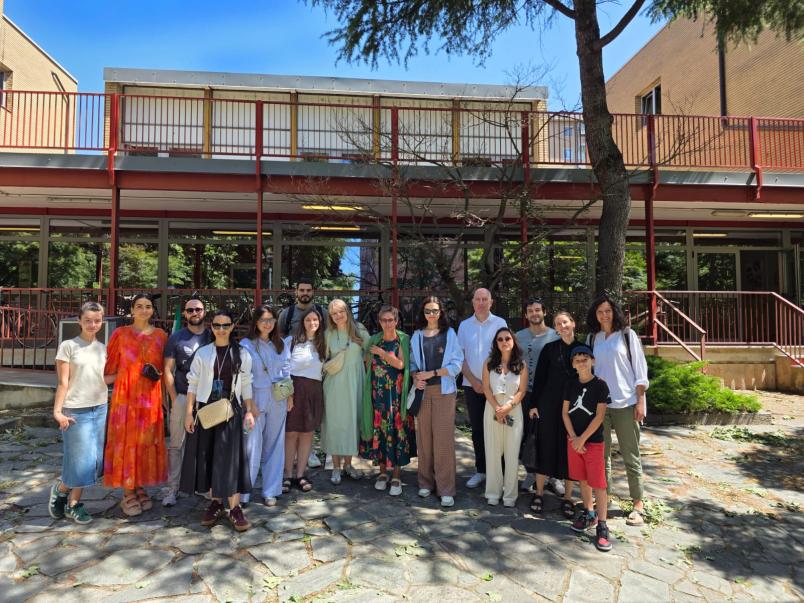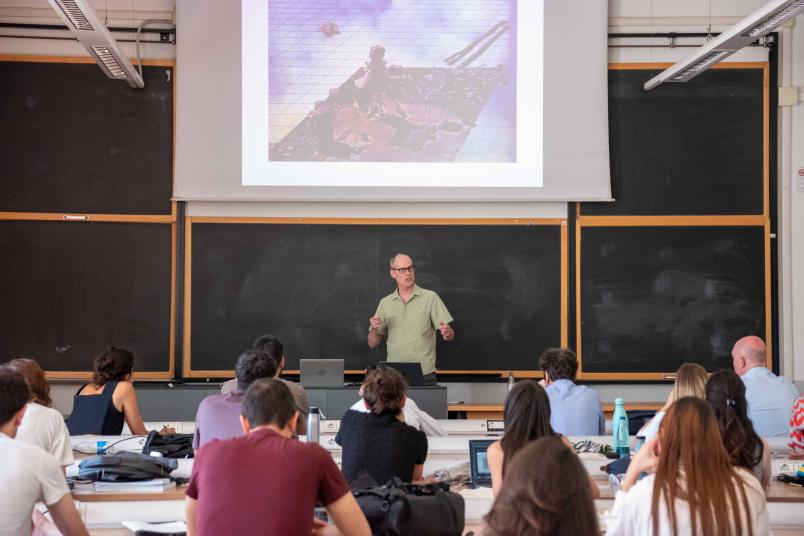
Housing Architecture in South-Eastern Europe: an International Seminar at PoliTO

Five days of exchange, over twenty participants, a public exhibition, and a field visit: from July 7 to 11, the Advanced Skills Seminar of the SEE:4C – South-Eastern Europe: 4 Cities project took place at PoliTO. The seminar focused on the transformation of residential districts in four South-Eastern European cities (Belgrade, Skopje, Tirana, and Podgorica), built from the second half of the twentieth century, before and during the transition to a market economy.
The seminar is part of the TNE DeSK – Trans National Education: Developing Shared Knowledge program, funded by the Italian Ministry of University and Research under the PNRR (National Recovery and Resilience Plan) and coordinated by the University of Bari (UniBa). The program promotes joint research and educational activities among European institutions, with a focus on sustainable transition.
SEE:4C brings together an international team made up of five partner universities: Politecnico di Torino, the Faculty of Architecture of the University of Belgrade, University of Montenegro, Polytechnic University of Tirana, and Ss. Cyril and Methodius University in Skopje. The research focuses on the legacy of residential architecture in four capital cities of the region (Belgrade, Skopje, Tirana, and Podgorica), with the goal of developing shared tools for its enhancement. At the core are the relationships between memory, identity, and contemporary urban transformations, with particular attention to local governance, heritage narratives, and social and environmental sustainability.
Almost a year into the project and following months of intensive academic and research mobility among the partner universities, the week in Turin offered a valuable opportunity for direct exchange through collaborative writing sessions, scientific coordination meetings, public presentations, and moments dedicated to visual methodologies in research.

One of the highlights of the week was the site visit on Wednesday, July 9, to the Mirafiori Sud neighborhood, led by Tecla Zaia, president of the ARIS association and founder of the Alloggiami project — a non-profit initiative launched in 2012 to revitalize the district through the creation of sustainable and inclusive multicultural communities. In over ten years, Alloggiami has welcomed more than 3,000 students from 51 countries, offering not only housing solutions but a true ecosystem for personal and academic development.
The visit provided international partners with the chance to engage with a residential context in Turin that shares many characteristics with the case studies in the Balkans — similar in typology, publicly promoted, and shaped by comparable urban dynamics — yet animated by grassroots practices of care and community regeneration. It was a meaningful opportunity to connect seemingly distant contexts, united by common challenges in managing residential heritage.
On Thursday, July 10, the SEE:4C – South-Eastern Europe: 4 Cities photo exhibition was inaugurated, featuring the work of photographer Giulio Marzullo, who captured the residential landscapes explored by the project. The exhibition was opened by DAD Director Michele Bonino and Vice Rector for International Affairs Alberto Sapora, and remained on display until July 14, attracting students, faculty, and external visitors.
That same day, the seminar also hosted a public lecture by Prof. Marc Schoonderbeek (TU Delft) titled "Mapping in Architectural Discourse: Discontinuity, Hetero-Topology and Multi-Dimensionality", focusing on the role of cartographic representation in architectural thinking and contemporary design discourse.
The seminar marked an important moment to strengthen collaboration among the partner universities, advance the scientific work of the project, and enhance its visibility within the Politecnico community.
The following participants took part in the initiative:
Politecnico di Torino (DAD Department): Mariolina Affatato, Alessandro Armando, Luna Bonaiuto, Daniele Campobenedetto, Irene Carrozzo, Valerio Della Scala, Roberto Dini, Manfredo Di Robilant, Valeria Federighi, Marija Jakimovska, Emanuele Morezzi, Lorenzo Murru, Caterina Ottaviano, Ludovica Rolando.
University of Belgrade (School of Architecture): Dalia Dukanac, Rade Mrlies, Jelena Ristic, Slavica Nikolcic, Luka Vujovic
University of Montenegro (UCG Podgorica): Sanja Paunovic, Irena Raijkovic.
Ss. Cyril and Methodius University in Skopje (UKIM): Ognen Marina, Sanja Avramoska, Adelina Fejza.
Polytechnic University of Tirana (UPT): Irina Branko.
Guest speaker: Marc Schoonderbeek (TU Delft).